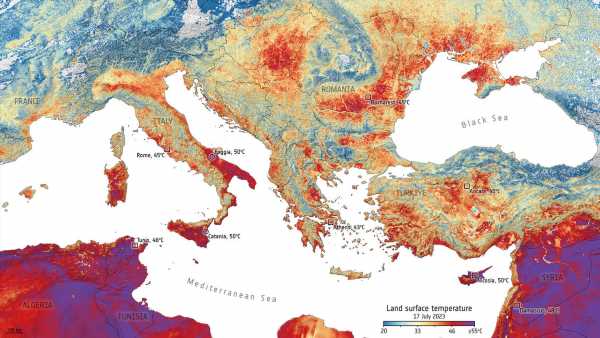Travel agents adjust trips as record heat wilts Southern Europe
The heat waves in Southern Europe this summer have been so intense, news outlets there have embraced names for them taken from the mythological underworld. Another used the quote “a giant pizza oven” to describe the sweltering region.
In parts of Greece, Spain and Italy this month, the mercury drove up to 113 degrees, just as thousands of Americans descended upon the Continent for summer vacations.
Sustained pent-up demand by U.S. travelers for European travel, combined with sustained high temperatures, have had the makings of an uncomfortable, exhausting and possibly even dangerous situation for travelers.
But advisors and tour operators said that clients, undeterred, are forging ahead with plans. And they are doing their best to help them beat the heat. In some cases, advisors are scrambling to rearrange schedules or accommodations to keep their clients as cool as possible.
“Europe has been our No. 1 pain point for this type of thing,” said Adam Duckworth, president and founder of Travelmation in Fort Lauderdale (No. 55 on Travel Weekly’s 2023 Power List).
Clients are double-checking that their hotels and rental cars have air conditioning, he said, and some are canceling tours or excursions or asking their advisors to rebook them for later in the day when the heat is less intense.
Suppliers have been largely flexible with making such changes given the circumstances, he said.
“There’s been some work for our advisors to be able to resituate some of our [clients] in that way, but that is something we exist to do,” Duckworth said.
Revenge travelers undeterred
Taunya Altamirano, owner of Live Love Drink Travel, a Dream Vacations franchise in Phoenix, said clients are largely forging ahead with travel plans, especially local clients, for whom an extreme heat wave in Europe could be relatively cooler: Temps in Phoenix soared above 110 degrees for more than 20 days in a row.
But they are asking for excursions or activities that are out of the sun or otherwise offer a chance to cool down. Altamirano has also seen an uptick in European river cruise requests from clients who want to tour multiple cities with one air-conditioned home base.
Altamirano said that clients were sticking to their trips “because we still have that revenge travel situation going on. They’re just asking for advice on how to stay cool.”
Christy Mahon, owner of the Dream Vacations franchise Escape Artist Holidays in Branchville, N.J., was in Europe during a heat wave last year and puts that experience to practical use. She now talks to clients about the heat before they book and warns them about temperatures, crowds and lack of shade, especially at some historic sites across Europe.
“I’ve had more pre-emptive conversations with people, no matter their age, no matter whether or not they’ve said the heat will be a problem. I’m kind of nipping it in the bud in some cases,” Mahon said, adding that some clients are shifting their trips to shoulder seasons.
For those who are traveling this summer, Mahon often gets in touch with them to ask how the packing is going and to suggest items like parasols or portable fans. She said she tries to give them advice “without rocking their boats.”
How suppliers adjust to the heat
On the ground in hot places, tour operators and even some cruise lines are making adjustments to keep guests cooler.
Operating small ships has given Windstar Cruises a good deal of flexibility. Stijn Creuptlandt, the line’s vice president of hotel operations and product development, said Windstar adjusted its arrival and departure times in the Mediterranean so passengers can tour in the morning or later at night, when it’s cooler.
In Santorini, for example, Windstar added a shoreside shuttle for guests so they don’t have to walk or wait for the tram or donkeys to transport them in the heat.
Windstar has also adjusted its own shore excursions. For example, guests will visit an outdoor monument early while temps are cooler, followed by an air-conditioned scenic ride.
Along with other travelers in Europe, the line made such changes to adapt when Athens’ top attraction, the Acropolis, began closing in the afternoon after workers at the site said that heat made conditions dangerous for both workers and visitors.
Michael Thomas, a longtime tour guide for Trafalgar and other TTC Tour Brands, said that the closure has not been an inconvenience, because TTC tours visit the Acropolis in the morning.
“If you go to somewhere like the Acropolis in Greece or the Great Pyramids in Egypt, you always should go early in the morning,” Thomas said. “Some of these big ancient sites have a lot of stone and therefore reflect a lot of heat. If you can preorder your tickets and get in there on the first ticket of the day, spend an hour or two in the site. Then by 10:30 a.m. when the sun is getting hotter, you can go back to your hotel and relax.”
He helps prepare guests by reminding them of the basics: carry a water bottle and wear long sleeves, hats and sunscreen.
“If I know it’s going to be really hot in town on a day, then maybe that afternoon I’ll take them up a mountain, where it’s cooler,” Thomas said, adding that guests can also opt to stay cool at their hotel or at a local café during an excursion. “There’s no point in going to see something if everyone’s so hot that they’re not going to enjoy it.”
Joanne Gardner, vice president of worldwide operations at Tauck, said the company operates fewer departures in July and August because many of its retired guests prefer shoulder-season travel.
“So with fewer trips operating, it’s easier for us to make adjustments more or less on the fly,” she said, such as changing river cruise itineraries so that guests spend more time onboard when it’s hot.
“We’ve been adjusting our river cruises to schedule more onboard learning from lectures, cooking demonstrations and tastings during the warmer parts of the day,” Gardner said.
___
Nicole Edenedo, Johanna Jainchill and Andrea Zelinski contributed to this report.
Source: Read Full Article




